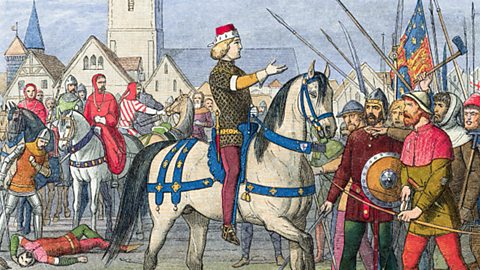Problems of the medieval era
Poverty is often linked to crime. Some people commit crimes to solve problems caused by them being poor, particularly to avoid starvation. Most people in the medieval era lived in poverty. This poverty drove some people to become thieves. In very extreme circumstances, it led to them becoming involved in revolts against royal authority.

Some of the problems that led to an increase in crime in the medieval era were:
| Problem faced | Description |
| Famine | When harvests failed and food became scarce, people had to steal food to stay alive. For example, this happened during the Great Famine of 1315т1317. |
| Disease | Diseases such as the Black Death, which started in the 1340s, killed lots of people and left land unfarmed. When this happened, people were at risk of starving, so they sometimes stole to stay alive. Additionally, when people died and buildings became abandoned, this gave criminals places to hide. |
| Increased taxation | When taxes were increased on people who were already very poor, this sometimes caused them to revolt against the authorities. This happened with the 1370s poll tax, which led to the Peasantsт Revolt in 1381. |
| Warfare | Battles often increased poverty in an area by destroying buildings in towns and farmland in the countryside. Also, sometimes battling armies stole the food they needed from the local area they were based in. This happened in military campaigns from the Norman Conquest in the 11th century through to the Wars of the Roses in the 15th century. |
| Problem faced | Famine |
|---|---|
| Description | When harvests failed and food became scarce, people had to steal food to stay alive. For example, this happened during the Great Famine of 1315т1317. |
| Problem faced | Disease |
|---|---|
| Description | Diseases such as the Black Death, which started in the 1340s, killed lots of people and left land unfarmed. When this happened, people were at risk of starving, so they sometimes stole to stay alive. Additionally, when people died and buildings became abandoned, this gave criminals places to hide. |
| Problem faced | Increased taxation |
|---|---|
| Description | When taxes were increased on people who were already very poor, this sometimes caused them to revolt against the authorities. This happened with the 1370s poll tax, which led to the Peasantsт Revolt in 1381. |
| Problem faced | Warfare |
|---|---|
| Description | Battles often increased poverty in an area by destroying buildings in towns and farmland in the countryside. Also, sometimes battling armies stole the food they needed from the local area they were based in. This happened in military campaigns from the Norman Conquest in the 11th century through to the Wars of the Roses in the 15th century. |
Opportunities for crime
As the economy grew during the medieval era, merchants began to transport more and more of their goods along roads and tracks between villages and towns. This led to an increase in highway robberyUsing force or the threat of force to steal money or property from travellers on the roads. Some villages along major routes became notorious as hideouts for highway robbers. One such village was Gainsthorpe in Lincolnshire, which was deserted after the Black DeathA disease that spread across Europe killing up to half of the population. It was situated next to Ermine Street, the old Roman road that connected London and York. The village became a base from which robbers attacked merchants.
Violent crime became more common in this era as people had easy access to potential weapons, especially farming tools such as hammers, sickles and spades. Around twenty per cent of the crimes committed in the first half of the 14th century were murder or manslaughter.